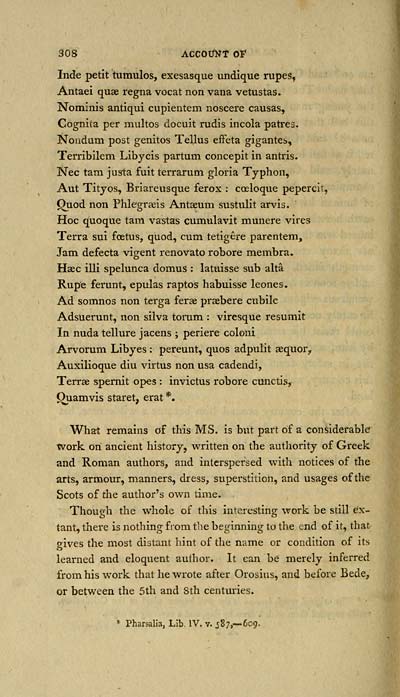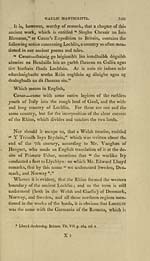J. F. Campbell Collection > Report of the Committee of the Highland Society of Scotland, appointed to inquire into the nature and authenticity of the poems of Ossian
(492)
Download files
Complete book:
Individual page:
Thumbnail gallery: Grid view | List view

308 ACCOUNT OP
Inde petit tumulos, exesasque undique rupes,
Antaei quae regna vocat non vana vetustas.
Nominis antiqui cupientem noscere causas,
Cognita per multos docuit rudis incola patres.
Noiidum post genitos Tellus efFeta gigantes,
Terribilem Libycis partum concepit in antris.
Nee tarn justa fuit terrarum gloria Typhon,
Aut Tityos, Briareusque ferox : cceloque pepercit,
Qnod non Phlegraeis Antaeum sustulit arvis.
Hoc quoque tam vastas cumulavit munere vires
Terra sui foetus, quod, cum tetigere parentem.
Jam defecta vigent renovate robore membra.
Ha£c illi spelunca domus : latuisse sub alta
Rupe ferunt, epulas raptos habuisse leones.
Ad somnos non terga ferae prasbere cubilc
Adsuerunt, non silva torum : viresque resumit
In nuda tellure jacens ; periere coloni
Arvorum Libyes : pereunt, quos adpulit aequor,
Auxilioque diu virtus non usa cadendi,
Terrae spernit opes : invictus robore cunctis,
Quamvis staret, erat *.
Wha-t remains of this MS. is but part of a considerable
work on ancient history, written on the authority of Greek
and Roman authors, and interspersed with notices of the
arts, armour, manners, dress, superstition, and usages of the
Scots of the author's own time.
Though the whole of this interesting work be still ex-
tant, there is nothing from the beginning to the end of it, that
gives the most distant hint of the name or condition of its
learned and eloquent author. It can be merely inferred
from his work that he wrote after Orosius, and before Bede,
or between the 5th and 8th centuries.
* Pharsalia, Lib. IV. v. 387,-609.
Inde petit tumulos, exesasque undique rupes,
Antaei quae regna vocat non vana vetustas.
Nominis antiqui cupientem noscere causas,
Cognita per multos docuit rudis incola patres.
Noiidum post genitos Tellus efFeta gigantes,
Terribilem Libycis partum concepit in antris.
Nee tarn justa fuit terrarum gloria Typhon,
Aut Tityos, Briareusque ferox : cceloque pepercit,
Qnod non Phlegraeis Antaeum sustulit arvis.
Hoc quoque tam vastas cumulavit munere vires
Terra sui foetus, quod, cum tetigere parentem.
Jam defecta vigent renovate robore membra.
Ha£c illi spelunca domus : latuisse sub alta
Rupe ferunt, epulas raptos habuisse leones.
Ad somnos non terga ferae prasbere cubilc
Adsuerunt, non silva torum : viresque resumit
In nuda tellure jacens ; periere coloni
Arvorum Libyes : pereunt, quos adpulit aequor,
Auxilioque diu virtus non usa cadendi,
Terrae spernit opes : invictus robore cunctis,
Quamvis staret, erat *.
Wha-t remains of this MS. is but part of a considerable
work on ancient history, written on the authority of Greek
and Roman authors, and interspersed with notices of the
arts, armour, manners, dress, superstition, and usages of the
Scots of the author's own time.
Though the whole of this interesting work be still ex-
tant, there is nothing from the beginning to the end of it, that
gives the most distant hint of the name or condition of its
learned and eloquent author. It can be merely inferred
from his work that he wrote after Orosius, and before Bede,
or between the 5th and 8th centuries.
* Pharsalia, Lib. IV. v. 387,-609.
Set display mode to: Large image | Transcription
Images and transcriptions on this page, including medium image downloads, may be used under the Creative Commons Attribution 4.0 International Licence unless otherwise stated. ![]()
| Permanent URL | https://digital.nls.uk/81748157 |
|---|
| Description | Volumes from a collection of 610 books rich in Highland folklore, Ossianic literature and other Celtic subjects. Many of the books annotated by John Francis Campbell of Islay, who assembled the collection. |
|---|
| Description | Selected items from five 'Special and Named Printed Collections'. Includes books in Gaelic and other Celtic languages, works about the Gaels, their languages, literature, culture and history. |
|---|

